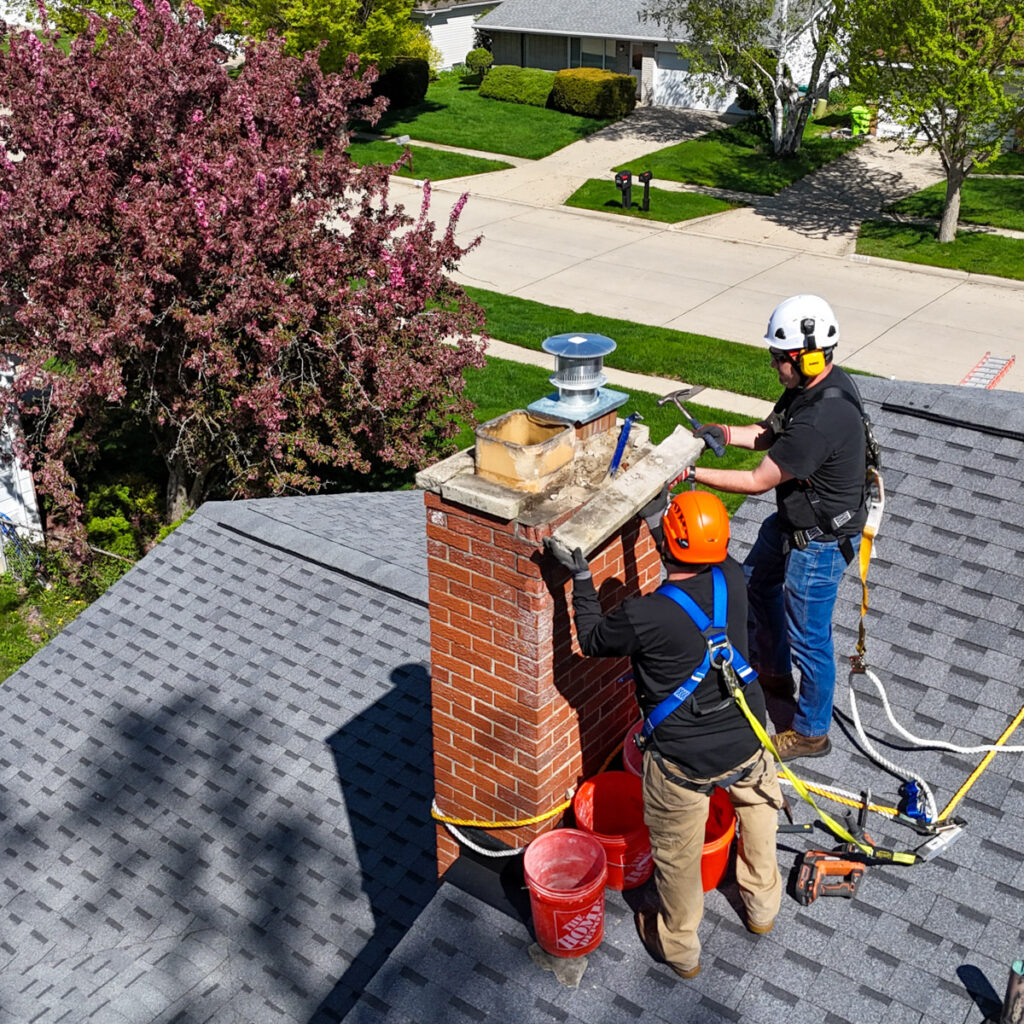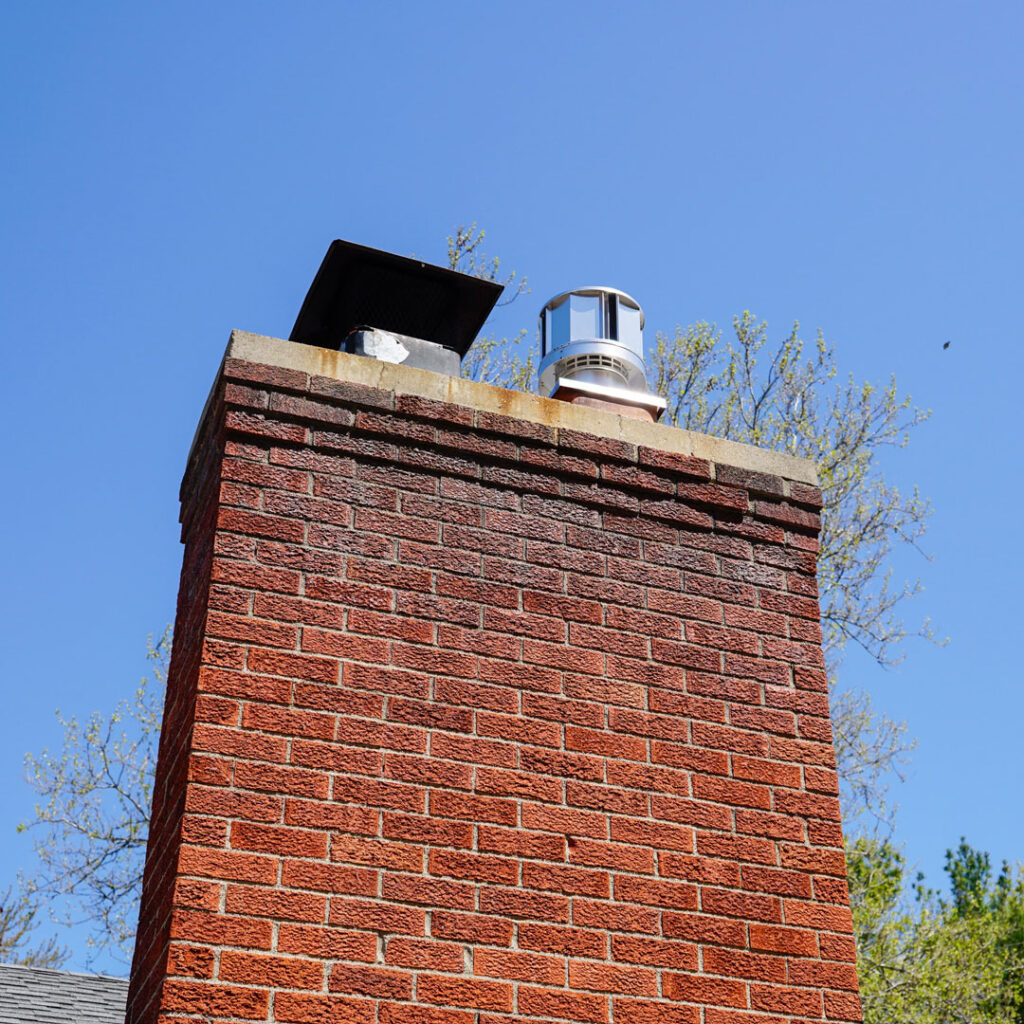If your chimney is severely damaged, letting it go can lead to significant issues like collapse. When you need expert chimney rebuilding, call Motown Fire. We’re the local experts serving homeowners in Chesterfield, MI, Grosse Pointe Park, MI, Grosse Pointe Shores, MI, Grosse Pointe Woods, MI, St. Clair Shores, MI, Auburn Hills, MI, Troy, MI, and the surrounding neighborhoods.
Even the sturdiest chimneys aren’t built to last forever. Over time, harsh weather—rain, snow, hail, and extreme temperatures—will wear them down. And if a chimney was constructed with poor materials or subpar workmanship, its lifespan can be much shorter than expected. That’s where Motown Fire comes in. We’re the local experts for chimney repairs.

Common Causes of Chimney Damage
Weather and Moisture
The number one enemy of your chimney is water. Rain, snow, and ice seep into small cracks in the bricks or mortar. As temperatures fluctuate, the bricks and mortar expand. This freeze-thaw cycle can break apart masonry and cause bricks to spall, flake, or fall off. Without proper protection, like a full-width chimney cap or waterproof sealant, moisture can also damage the chimney crown, flashing, and the interior flue.
Settling and Foundation Movement
Over time, your home’s foundation can shift or settle, putting stress on the chimney’s structure. If the chimney wasn’t built on a properly reinforced footing, it may begin to leak or crack as the soil underneath moves. This is especially common in older homes with expansive clay soils.
Poor Construction or Materials
Not all chimneys are created equal. Some may have been built with subpar materials or techniques, especially if they were added as part of a renovation. Weak mortar joints, improperly spaced bricks, or poor alignment can all contribute to early failure. In these cases, you may need to reconstruct the chimney, which may be more cost-effective than repairs.
Chimney Fires
When creosote builds up in the flue and ignites, it can reach temperatures of over 2,000 degrees Fahrenheit. Even if the fire doesn’t spread to the rest of the house, the intense heat can crack flue liners and damage the surrounding masonry. If your chimney was involved in a fire—even a small one—it may need a full structural rebuild to ensure safety.
Age and Normal Wear
Like any part of your home, chimneys wear down with age. Mortar naturally degrades over time, especially if it hasn’t been tuckpointed or maintained. Chimneys that are 50-100 years old may simply be at the end of their service lives.
Signs Your Chimney May Need Rebuilding
Large or Widening Cracks
Hairline cracks in mortar are fairly common and can be repaired. But if you notice wide cracks in the bricks, missing mortar joints, or gaps big enough to stick your finger into, that’s a red flag for serious damage.
Spalling or Crumbling Bricks
If you see bricks flaking, crumbling, or falling from the chimney, it’s a strong sign that water has penetrated the masonry. Spalling weakens the structural integrity and usually indicates that the damage is more than skin deep.
Water Leaks in the Home
Moisture staining on walls or ceilings near the chimney can signal a deteriorated chimney crown or cracked masonry, letting in water. Ignoring it may lead to rot and moisture inside the walls. If leaks persist even after minor repairs, the structure may need to be rebuilt.
Chimney Leaning or Tilting
A leaning chimney is more than just unsightly—it’s a major safety hazard. If the chimney is pulling away from the house or visibly tilting, it may indicate a shifting foundation or severe structural failure. Rebuilding is the only solution in this case.
A failing chimney isn’t just a cosmetic problem; it can pose serious threats to your home. If you notice signs of crumbling bricks, leaning, or water damage, it’s time to have your chimney inspected. Call Motown Fire at 586-260-6121 for a professional inspection today.




